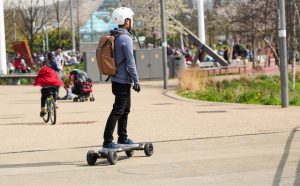Electric skateboarding is a fantastic way to get around, and many of us share a passion for electric vehicles. We recognize that it is essential to understand and follow the regulations surrounding its use to ensure safety, so we’ve created this comprehensive guide to electric skateboarding laws. Knowing some local skateboarding laws regarding the rules and uses of an electric skateboard is best.

We’ll cover basic rules, helmet laws (always wear a helmet), safety regulations, and guidelines for riding a battery-operated skateboard on public roads and sidewalks. Additionally, we’ll discuss the repercussions of not following the rules and how we can advocate for more electric skateboard-friendly laws in our roads and communities.
This guide will help you confidently navigate the law related to electric skateboards, so let’s get started!
We will also discuss the associated attributes:
- Helmet Policies (wearing a helmet is mandatory)
- Safety Regulations (speed limits, no riding while intoxicated)
- Guidelines for Riding on Public Roads and Sidewalks (following traffic rules and regulations, no riding electric boards in prohibited areas)
By following the rules and regulations related to electric skateboards, we can ensure a safe and enjoyable experience for everyone.
Electric skateboards have revolutionized urban mobility by offering an efficient, eco-friendly alternative for short-distance travel. When riding electric skateboards, it’s essential to adhere to the regulations regarding maximum speed and the miles per hour limit set by local laws to ensure safety. Many areas permit a maximum speed of 20 to 25 miles per hour, balancing safety and efficiency.
For enthusiasts who find riding electric skateboards fun, understanding where you can legally skateboard on the road is essential. Regulations often require riders to skateboard in designated lanes, responsibly sharing the space with other motor vehicles. This ensures that everyone using the road, including those riding electric skateboards, can do so safely.
Base camp for electric skateboard enthusiasts often includes community forums and local clubs where riders share tips and advocate for better access and safety measures. This base camp is crucial for building a supportive community and pushing for favorable regulations. A well-established base camp can significantly influence local policies regarding where and how you can skateboard on the road.
Additionally, the base camp is a hub for new riders to learn about the proper techniques for riding electric skateboards and the importance of adhering to any vehicle’s miles-per-hour speed limits. Whether it’s your first time setting foot on an electric skateboard or you’re a seasoned rider, visiting a base camp can enhance your understanding and appreciation of this innovative mode of transport.
Lastly, while riding an electric skateboard, constantly monitor your maximum speed to ensure it does not exceed the stipulated miles per hour limits. Safe practices protect the rider, pedestrians, and other road users, making skateboarding on the road a better experience for everyone involved.
Electric Skateboarding Laws: Key Takeaways
- We will explore the maze of electric skateboard policies together at FamilyHype, highlighting their importance for our safety and peace of mind. Since electric boards are part of the broader land motor vehicle entity, riders should know electric skateboard laws such as no-ride zones, speed limits, helmet requirements, licensing, and age restrictions.
- It’s important to respect other road users, wear a helmet, abide by the rules, and follow the guidelines for electric longboard riders to ensure we can enjoy our rides without hassle.
- If the rules seem too restrictive, let’s advocate for change. Understanding and obeying the policies keeps us on the right side of the law and helps ensure that electric longboard riders can continue to have a safe and enjoyable state of mind and experience.
Skateboarding: Understanding Electric Skateboard
You’ve got your shiny new electric skateboard and want to ensure you ride legally and safely. Here at FamilyHype, we want to ensure you understand the rules governing its use and know the basics of board customization legality and board charging regulations.
- Wearing protective gear for maximum protection against serious injuries is essential to ride an electric board safely. Although an electric skateboard is motorized, it often follows the same traffic laws as e-bikes, requiring adherence to local ordinances and traffic laws, especially when riding the motorized bike on the sidewalk, main streets or busy roads.
- Users should ensure their electric skateboards are appropriately charged, avoid crowded and busy roads, and prefer quiet streets or a designated bike path to minimize possible encounters with pedestrians, near dogs, or situations where they might not have the right of way.
- Following these safety precautions and safety tips can help avoid unnecessary trouble and reduce the chances of having the police catch you operating this wheeled device inappropriately, like using the board on the road where it may annoy people or on a sidewalk where it’s not permitted.
Let’s move deeper into specific regulations regarding using battery-operated skateboards, from skatepark regulations to traffic rules.
Skateboarding: Electric Skateboarding Law
Skateboarding is a great recreational activity, and we must ensure everyone is safe when using electric boards.
- We must know the safety, motor vehicle policies, battery regulations, and helmet laws and requirements in public. It is essential to wear a helmet.
- Additionally, it’s important to understand risk, speed limit, health, and protection.
With this knowledge, you can have a safe and enjoyable experience on your electric skateboard.

Skateboarding: Electric Skateboard Uses
Are battery-operated boards or electric skateboardslegal? Before you hit the road with your motorized board vehicle, it’s crucial to understand that regulations vary significantly by location and can impact where and how you ride. Laws may dictate necessary board modifications or require licensing.
- Electric Skateboards For Commuting
- Electric Skateboards For Recreation
- Electric Skateboards For Sport and Fitness
- Electric Skateboards For Campus Transportation
- Electric Skateboards For Eco-Friendly Travel
- Electric Skateboards For Tourism
- Electric Skateboards For Transportation
- Electric Skateboards For Socializing
It is crucial to be aware of the regulations that make it legal to ride a battery-operated skateboard and ensure you’re adhering to them.
- In the United States, the regulations on legalized e-boards are primarily governed by state and local governments rather than federal laws.
- The speed limit is among the regulations that make electric skateboards legal, varying from region to region and age restriction. Different areas may not have the same rules regarding this sport.
- Some regions allow boards on bike lanes, while others may have specific regulations or restrictions regarding their use in such lanes.
- Some regions prohibit motorized vehicles such as motorcycles, truck tractors, and electric skateboards on public roads.
- To safely and legally ride your electric skateboard, it is crucial to check the local ordinances and regulations of the region where you plan to ride an electric skateboard. Following rules is a must in this sport.
Electric Skateboarding: Electric Skateboard Helmet Laws
- As we focus on laws related to electric skateboards, we must keep safety in mind and remember to wear our safety gear, such as a helmet. Wearing a helmet can help protect you in the event of an accident and is a critical factor in obeying the law. So, wear a helmet when taking your ride on roads.

- Taking to the road and street on your board without a helmet isn’t just risky business. It’s often against the law. Whether you’re an experienced rider or just starting, practice legal and responsible riding habits, especially when going for ride on roads.
- Innovations in helmet design have made the best accessories for electric skateboards safer and more comfortable. At the same time, protective gear advancements extend beyond helmets to wrist guards and knee pads. Many jurisdictions require helmets by law, especially for minors going for ride on roads.
- Maintaining safety while using the best accessories for electric skateboards and practicing responsible riding habits is essential.
Whether cruising around town on your battery-operated scooter or hitting the skatepark with the best electric skateboard, staying safe is paramount. By following the safety regulations and helmet laws, you can enjoy this sport and protect yourself and others on the road.
Electric Skateboarding Law
Now, we’ll explore the rules for navigating public roads and sidewalks. Remember that this sport is a form of transportation and recreation, so stay aware of your surroundings and pay attention to traffic rules. Otherwise, you will have to face a police officer. Be sure to wear the proper protective gear, such as helmets, wrist guards, and knee pads, and follow the law and the rules of the road.
- Electric skateboard safety gear
- Electric skateboard local laws and policies
- Electric skateboard and designated parks
- Electric skateboard traffic signals
- Electric skateboard safe speed
- Electric skateboard safe distance
- Electric skateboard preparedness
- Electric skateboard engagement
- Electric skateboard signal turns

Hitting the pavement on your longboard is an exhilarating experience, but it’s essential to remember that public roads and sidewalks have rules and regulations for safe riding. Regular maintenance on your vehicle is necessary to ensure you’re not a hazard to others. Further, ensure you are riding at a moderate speed to avoid hurting yourself and others. Since going for ride on roads are public property, maximum speed and other guidelines are in place to ensure everyone can share them safely.
When night riding, it’s essential to have appropriate lighting for visibility. Respect traffic rules since everyone’s safety on the road is necessary. The right size wheels and a lightweight board are crucial, and wearing appropriate protective gear is required to ensure a safe and enjoyable experience. Disregarding electric skateboarding laws can have serious consequences.
Breaking Electric Skateboard Law
- Skateboarding on a fair day with the white light of the sun and the wind blowing your hair is such a satisfactory experience. However, ignoring the regulations surrounding electric skateboard riding can land you in hot water, with penalties ranging from hefty fines to the potential confiscation of your beloved board. Legal repercussions may include fines or citations, confiscation of your board, community service, or jail time.
- The community impact of breaking these rules is significant. It could tarnish our reputation as responsible e-skaters, affecting the sports culture and creating a negative impression of the spore.
Advocating for more electronic skateboard-friendly rules is crucial in our collective effort to serve others better. This includes creating a safe and enjoyable environment with laws and regulations that are fair and easily understood.
Electric Skateboarding Laws
In California and Florida state, the legal definition of an electric board, or e-skateboard, has evolved to include boards with an electric propulsion system. These boards are now legalized electric boards under state-level and federal rules of California and Florida, allowing electric skateboard users to ride an electric skateboard in public areas and public places like bicycle lanes, bike lanes, and sometimes sidewalks, under certain no conditions. Florida law explicitly classifies them separately from human propulsion vehicles like bicycles. These boards must have a minimum set of safety features, such as a front white light, yellow reflectors, and a red reflector.
They must adhere to local rules regarding the average power and speed of their board, typically capped at a specific number of miles per hour. Unlike the semitrailer semitrailer combination, which may include a truck tractor, these boards are primarily for transport and outdoor activities on highways and other public places.
Electric skateboard riding is a passion for many and an essential part of many people’s lives. It’s important to remember that skateboarding involves risk and that regulations exist to ensure the safety of those involved. By understanding the potential consequences of breaking electric skateboarding laws, such as fines, confiscation, community service, or jail time, we can all work together to promote responsible riding of an electric board and create an enjoyable and safe environment for everyone. We hope that by making this blog article, we can encourage a better understanding of the consequences of breaking electric skateboarding laws. Ride an electric skateboard responsibly to enjoy its freedom while adhering to local regulations. Whether commuting to work or enjoying a leisurely ride, ride a new electric skateboard with safety in mind. Always wear protective gear when going for ride on roads, follow traffic laws, and ride an electric skateboard with the utmost caution to keep yourself and others safe.
More Electric Skateboarding Laws
Pushing for more flexible and friendly policies toward e-skateboarding isn’t just about freedom on wheels. It’s about painting a vibrant picture of respect, safety, and shared spaces.
Through electric skateboard lobbying, we can influence policy to accommodate this growing transportation mode better. This includes ensuring the safety of skateboarders by including adequate electric skateboarding lanes and safety protocols and making sure electric boards have the same rights and responsibilities as other road users.
Riding an electric skateboard isn’t just us serving ourselves – it’s about creating a safe and supportive environment for riding an electric skateboard to enjoy the sport.
Together, we can make riding an electric skateboard safer and more accepted worldwide. Riding an electric skateboard should be a recognized and respected form of transportation, promoting convenience and environmental sustainability.
Electric Skateboard Conclusion
We’ve explored the maze of electric skateboard law together, highlighting their importance for our safety and peace of mind. While riding is a fun activity, riders must understand and obey the law regarding electric skateboards.
Electric boards are a part of the broader legal framework for land motor vehicles. Riders should be aware of laws such as no-ride zones, speed limits, helmet requirements, licensing, and age restrictions.
In many states, skateboarding has become a recognized mode of transport, especially in urban areas like the city, where skateboards are allowed on the sidewalk and certain bicycle lanes. The state law typically sets the maximum speed limit at 15 mph to ensure safety in traffic. For years, advocates have pushed for these rights to solidify, providing new opportunities for commuters. It’s crucial to wear helmets and appropriate protective gear to comply with police regulations and safeguard personal property. Always stay updated with the latest information on your local blog about bike and skateboard laws to navigate the city effectively and legally.
Respecting other person or road users, wearing the best helmet for electric skateboard safety, and following the law is crucial to keeping electric boards legal and ensuring safe electric scooter usage, allowing us to enjoy our rides without hassle. If the regulations seem too restrictive, let’s advocate for change. Understanding and obeying the rules keeps us on the right side and helps ensure that electric skateboard riders can continue to have a safe and enjoyable experience.
Frequently Asked Questions (FAQs)
How To Test If The Battery Is Fully Charged?
What Is A Board Jump Called?
Last Updated on July 2, 2024 by Allen Laconsay
DISCLAIMER (IMPORTANT): This information (including all text, images, audio, or other formats on FamilyHype.com) is not intended to be a substitute for informed professional advice, diagnosis, endorsement or treatment. You should not take any action or avoid taking action without consulting a qualified professional. Always seek the advice of your physician or other qualified health provider with any questions about medical conditions. Do not disregard professional medical advice or delay seeking advice or treatment because of something you have read here a FamilyHype.com.